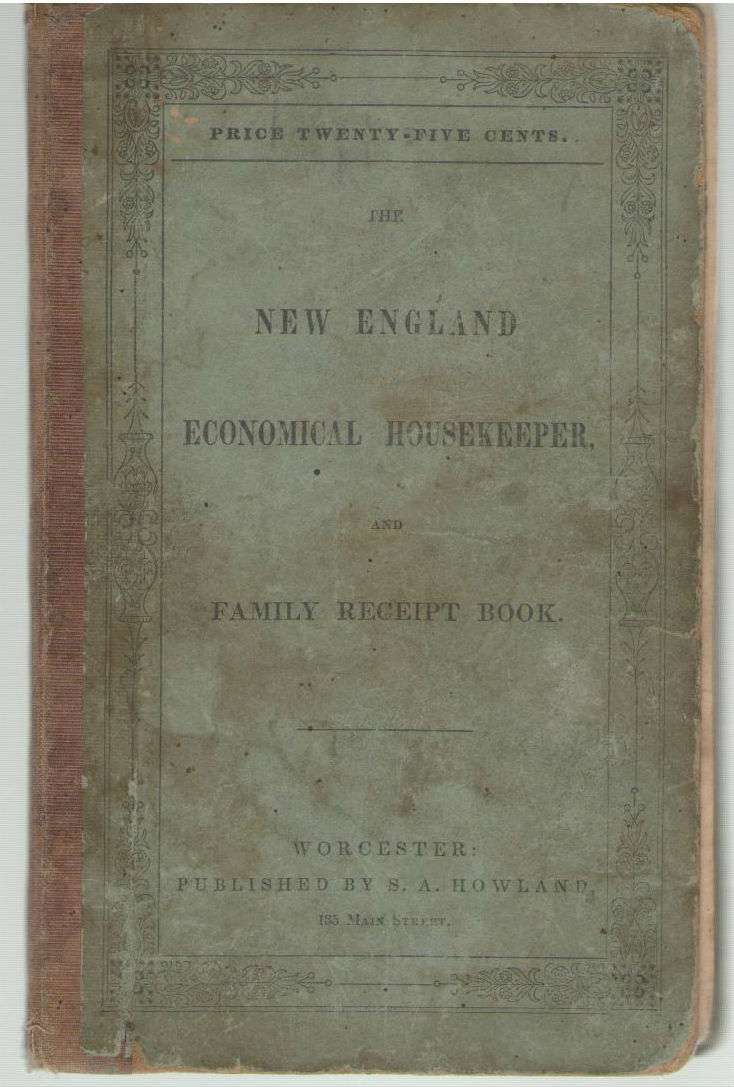It is interesting to note that in the cookbook The American Economical Housekeeper and Family Receipt Book ("receipt" meaning "recipe") by Mrs. E.A. Howland, written in 1845 and having remained in publication for the next 45 years, the difficulty of digesting bread made of wheat flour is addressed on the very first page. With all the issues surrounding modern-day gluten sensitivity, it is fascinating to discover directions on making wheat bread more easily digestible. One must wonder if within there is some application that could relate to easing our modern-day consumption and digestion. Of course modern-day U.S. grown wheat has been modified to include a higher level of gluten--which certainly may attribute to the increase in gluten sensitivity. In addition, our wheat is more finally milled than the wheat in the 1800s and therefore the remnants of the grain within the wheat flour itself would more than likely account for the need of the bread to ripen or cure, as we might think of it in modern-day terms. Section I entitled "Ripe Bread" discusses the importance of allowing the bread to change, or ripen, before being eaten as wheat bread taken out of the oven is "unprepared for the stomach".
"...Young persons, or persons in the enjoyment of vigorous health, may eat bread immediately after being baked, without any sensible injury from it; but weakly and aged persons cannot, and none can eat such, without doing harm to the digestive organs."
Now, on one hand it might make sense to let the bread ripen had it been made of sourdough as most breads in the early 1800s were. However, this cookbook is from 1845 and the recipes that follow call for yeast or saleratus (baking soda) rather than a sourdough starter so I revert back to the larger amount of grain left within the flour itself as reason for need to ripen. Reference is made to bread going through a change similar to that of "newly-brewed beer, or newly-churned buttermilk, neither being healthy until after the change." The Economical Housekeeper explains:
"During the change in bread, it sends off a large portion of carbon, or unhealthy gas,and imbibes a large portion of oxygen, or healthy gas. Bread has, according to the computation of physicians, one fifth more nutriment in it when ripe, than it has when just out of the oven."The next line is absolutely brilliant:
"It not only has more nutriment, but imparts a much greater degree of cheerfulness."Essentially then to eat unripened bread referenced one to then be left with a "less brighter spirit". Now, it goes on to discuss the importance of all housewives to connect in this thought that as the bread discharges carbon it "imbibes" oxygen therefore it is essential for the "bread to ripen where it can inhale the oxygen in a pure state". In this day and age we don't oftentimes think about smells and how they can "contaminate" food when they are left out in the open. However, we can relate to the experience of a strong smell in the refrigerator essentially permeating the food and causing it to taste as of the smell. In 1845 there would have been far more odors emanating from the home and it was recommended that the housewife take note of this and to make sure the air is pure where the bread is left to ripen.
"Bread will always taste of the air that surrounds it while ripening--hence it should ripen where the air is pure. It should never ripen in a cellar, nor a close cupboard, nor in a bedroom. The noxious vapors of a cellar, or a cupboard, never should enter into and form a part of the bread we eat."
The Economical Housekeeper goes on to explain how to "renew" bread that is several days old "so as to have all the freshness and lightness of new bread"
"...by simply putting it into a common steamer over a fire, and steaming it half or three quarters of an hour. The vessel under the steamer, containing the water, should not be more than half full; otherwise the water may boil up into the steamer, and wet the bread. After the bread is thus steamed, it should be taken out of the steamer, and wrapped loosely in a cloth, to dry and cool, and remain so a short time, when it will be ready to cut and use. It will then be like cold, new bread."I find it interesting that she referred to the bread as "cold". I believe that was her directive to say that you should allow the bread to fully cook in order to enjoy the quality of a like-new bread. There are many things in the cookbook that are presumptive in that it is believed by the author that the reader has a basic knowledge of cooking. Even with a modern-day basic knowledge of cooking--these recipes would be difficult to follow as the terms and means of cooking are so much different than they are today. A simple look at the picture below from the inside page of the book depicting a "modern" kitchen is all that is needed to see that the means of cooking have much changed in the past 168 years. Note that two women are needed to get the task done! Cooking was a time-consuming and essential part of everyday life in the 1800s.
"Don't forget to ripen your bread." would most definitely be met with some confusion (and perhaps an odd look) in this modern-day era as this certainly is not a term currently used to refer to bread and its proper preparation. Nevertheless, I find old cookbooks fascinating as they do present a small window into the past and the times wherein they were written.
"Until we meet again, may God hold you in the palm of His hand."
(An old Irish blessing)
Marian Boveri, Real Estate Consultant
Specializing in Historic Homes
Keller Williams Fox Valley Realty
847-308-2424
www.ThisLooksLikeHome.com



